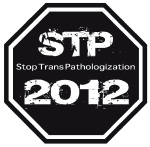 The Examiner has a two-part article (link to Part 1 here, link to Part 2 here). It’s about the increased use of so-called ‘transsexual porn’ by cis men and contains so many wrong ideas it’s hard to know where to start…
The Examiner has a two-part article (link to Part 1 here, link to Part 2 here). It’s about the increased use of so-called ‘transsexual porn’ by cis men and contains so many wrong ideas it’s hard to know where to start…
…*picks up the pink sparklehammer of deconstruction*…
How about we start with the title? “Man’s ‘secret love’ of transsexual women: Do new trends predict a second sexual revolution?” So, why is it a “secret love”? Is it because that to say it publicly would demonstrate that the cis man is using pornography that other cis men might deem to be outside the parameters of what’s acceptable to them? The problem there is that the cis man’s sexual orientation is given more weight than the transsexual woman’s gender identity.
Research gathered from more than a dozen major sources […] reveals that nearly 190 million heterosexual men are attracted to transsexual women and actively seek romantic contact with or sexually explicit images of them annually.
I wonder how many transsexual women reciprocate that interest. It seems to me that living in a world where the many forms of violent oppression against us – invariably at the hands of cis men – could make a transsexual woman very wary of having “romantic contact” with any cis man, regardless of his sexual orientation.
“The Internet really has made the whole thing more popular in the last few years,” says Steven Gallon […] “You’re now seeing [transsexuals] [sic] in mainstream advertising and on TV shows. That and the Internet have made it [socially acceptable for transsexuals] [sic] to be out there on display.”
Oh how we love sweeping generalisations based on incorrect assumptions and stereotypes. The – comparatively few – transsexual women seen in the mass media are usually hypersexualised and portrayed as conforming to all the binary ‘norms’ applied to cis women; there is no room for the less ‘glamorous’ of us. In addition, more often than not the – comparatively few – roles of transsexual women are given to cis women. And anyone who seriously thinks that it’s “[socially acceptable for transsexuals] [sic] to be out there on display” has obviously not been keeping up with the news feeds, nor spent any time at the TDOR website.
Such displays come as no surprise to Hollywood darling Seth Rogen […] “One thing I’ve learned through various mainstream sex sites is that way more guys are into transsexual porn than one would like to think,” […] “I feel like it’s the elephant in America’s room: the secret love of transsexual porno.”
That is such a depressing quote. It centres the experiences of cis men above those of transsexual women and, in the process, contributes to our further marginalisation and objectification via this gross hypersexualisation. And, for me, the ‘elephant in the room’ quote underlines how many cis men evidently feel guilty about, and uncomfortable with, their sexualities and project that on to transsexual women.
All of that is bad enough, but it bothers me more that the lived experiences of transsexual women sex workers are completely erased in pursuit of making cis men feel better about themselves. The fact is that many transsexual women move into sex work because it’s the only form of paid work open to them. Hormone therapy and surgery does not come cheap, and having to do sex work to pay your medical bills seems to me like coercion, plain and simple, and nothing at all to do with spearheading a ‘sexual revolution’. But no, we must overlook that and concentrate on ego-stroking the cis men. (An aside: how many of the transsexual women thus coerced into sex work have yet to undergo surgery – and is surgical status a factor in the manufacture and consumption of ‘transsexual porn’?)
But it’s the “heterosexual male” descriptor that continues to baffle many observers – or so they claim. Might they, too, be harboring a “trans-secret?” Gallon thinks they might be: “The majority of customers [who purchase transsexual porn] are straight men.” In fact, Gallon says, “[transsexual content generates] practically no response in the gay market at all. I don’t even bother to promote it to the gay market, because it would be a waste of money.” Not only are most of his customers heterosexual men, Gallon says, “some are movie stars, rock stars and sports figures” – guys most would consider “heterosexual role models.”
“Let me tell you, it’s not gay,” […] “Gay men do not want to watch [transsexual women]. It’s straight men who want to watch it.”
This is quite a compelling insight into the testosterone-fuelled and prejudiced logic of those cis men who use ‘transsexual porn’. These “heterosexual role models” are just as likely to react with violence towards any transsexual women they come across in real life, who dares not to meet their absurd constructs of how we should express ourselves – and yet will happily accept images of a transsexual woman’s sexed body, provided it’s in a sexual context, and provided they still control the context. How many of these cis men – were they to find themselves in a real life tryst with a transsexual woman – would be prepared to indulge in recreating demeaning onscreen fantasies with a living sentient being with her own needs and desires, instead of viewing passively?
And as for the barely concealed gay panic that runs through the quotes: is this not, in reality, another manifestation of the transphobic tropes that transsexual women can only ever be our assigned-at-birth gender and are nothing more than deluded “blokes in frocks”? (Note also that not one of these “socially acceptable” transsexual women appears in the interviews included in the article)
There may be a “willing suspension of disbelief” when cis men make and use transsexual porn, but they sure as hell keep a firm grip on their cissexism and trans-misogyny while they’re at it…
—————
Cross-posted at Harlot’s Parlour



 It occurs to me that I’ve not written about receiving my
It occurs to me that I’ve not written about receiving my 